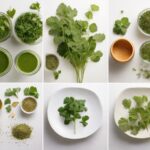Diving into the world of cooking can be both exciting and challenging for those taking their first steps in this fascinating culinary discipline. In this article, we’ll focus on providing guidance and essential tips for those embarking on culinary initiation. From selecting the right utensils to understanding basic cooking techniques, we’ll explore the fundamentals that will help you begin your gastronomic journey with confidence and enthusiasm. If you’re a beginner eager to learn and perfect your skills in the kitchen, you’ve come to the right place! Keep reading to discover the key tips that will prepare you to become a confident and competent amateur chef.
Equip Yourself Properly: Tools for Culinary Success
Before immersing yourself in the world of cooking, it’s crucial to ensure you have the right tools at your disposal. Choosing the right utensils not only makes the food preparation process easier but also influences the quality of your culinary creations. Here are some essential items that every kitchen beginner should consider:
Quality Knives
Invest in a basic set of kitchen knives that includes a chef’s knife, a paring knife, and a bread knife. Sharp knives make precise and safe cutting of various ingredients easier.
Discover the top selection of knives in our e-shop
Sturdy Cutting Boards
Opt for durable and easy-to-clean cutting boards, preferably made of wood or plastic. Having multiple boards of different sizes will allow you to organize and separate ingredients during preparation.
Non-Stick Pans
A good non-stick pan is essential for cooking a wide variety of dishes, from quick sautés to perfectly cooked omelets. Make sure to choose high-quality pans that distribute heat evenly and are easy to clean.
Pots of Different Sizes
From small pots for sauces to large pots for boiling pasta, having a variety of pots of different sizes will allow you to tackle a wide range of recipes with ease.
By equipping yourself with the right tools, you’ll be prepared to face any culinary challenge with confidence and efficiency. Remember to take care of your tools and keep them clean and well-organized to prolong their lifespan and ensure a pleasant culinary experience. You’re now ready to take the next step in your culinary journey with safety and determination!
Master Basic Techniques
Mastering basic culinary techniques is essential for any aspiring chef. These skills provide the foundation upon which you’ll build your culinary expertise. Here are some essential techniques you should learn:
Chopping and Cutting
Learn to finely chop, dice, and slice ingredients uniformly. This not only enhances the presentation of your dishes but also ensures even cooking.
Sautéing
The sautéing technique involves quickly cooking ingredients in a hot pan with a little oil. It’s essential for sautéing vegetables, meats, and seafood, adding delicious flavor and texture to your dishes.
Baking
Understand the basics of baking, including the correct oven temperature, cooking times, and how to mix and prepare dough. From cakes and cookies to bread and gratins, baking is a versatile technique worth mastering.
Slow Cooking
Learn to slow cook to develop deep, tender flavors. This technique is perfect for stews, soups, and braises and requires patience and attention to detail.
Practicing these basic techniques will help you gain confidence in the kitchen and prepare you to tackle more complex recipes in the future. Remember that consistent practice is key to perfecting these skills, so don’t be afraid to experiment and keep learning as you progress on your culinary journey.”
Learn more about basic culinary techniques with our article “Unlock Your Culinary Potential: Beginner’s Guide to Essential Techniques”
Start with Simple Recipes: Step-by-Step Toward Culinary Confidence
When embarking on your culinary journey, it’s crucial to begin with simple recipes and gradually progress to more elaborate dishes. Here are some key tips to kickstart your culinary adventure successfully:
Select Basic Recipes
Opt for recipes that require a limited number of ingredients and preparation steps. Dishes like fresh salads, gourmet sandwiches, or simple pastas are excellent choices for beginners.
Familiarize Yourself with Ingredients
Before you start cooking, take the time to familiarize yourself with the ingredients you’ll be using. Read labels, research their properties, and learn how to handle them correctly.
Follow Instructions to the Letter
Carefully read each step of the recipe and follow the instructions precisely. Don’t hesitate to consult online tutorials or cooking videos to ensure you understand each step correctly.
Stay Calm and Patient
The kitchen can be a place of experimentation and learning, so don’t be discouraged if something doesn’t turn out as expected in your first attempts. Keep calm, learn from your mistakes, and move forward with determination.
Celebrate Your Achievements
Don’t underestimate your culinary achievements! Every dish you prepare is an opportunity to learn and improve. Celebrate your successes, no matter how small, and share your creations with friends and family.
By starting with simple recipes, you’ll gradually develop solid culinary skills and gain confidence in the kitchen. Remember that consistent practice is key to perfecting your skills and becoming a skilled amateur chef. Now is the time to put these tips into practice and begin your exciting culinary journey!
Organize Your Workspace: Key to a Smooth Culinary Experience
A well-organized kitchen is essential to ensuring a seamless culinary experience. Follow these tips to keep your workspace neat and efficient:
Prepare Your Ingredients in Advance
Before you start cooking, make sure you have all the necessary ingredients measured, chopped, and ready to use. This will help you avoid interruptions during the cooking process.
Clean as You Cook
As you prepare your recipes, clean utensils and work surfaces that you no longer need. This will help you maintain order and minimize clutter buildup while cooking.
Use Storage Containers
Store leftover ingredients in airtight storage containers to keep them fresh and organized. Label the containers with the name and expiration date for easy identification.
Assign Specific Areas for Each Task
Designate specific areas of your kitchen for specific tasks, such as chopping, prepping, and cooking. This will help you maximize available space and maintain an efficient workflow.
Clean Up When Finished
Once you’ve finished cooking, take a few minutes to clean and tidy up your workspace. Wash dishes, wipe down surfaces, and put utensils and ingredients back in their proper place.
By organizing your workspace effectively, you’ll feel more calm and confident while cooking, allowing you to fully enjoy the culinary experience. Remember, a tidy kitchen not only facilitates the cooking process but also contributes to creating a pleasant and welcoming environment. Now is the time to put these tips into practice and transform your kitchen into a space of creativity and culinary delight!”
Experiment and Be Creative: Discover Your Unique Culinary Style
Even though we’ve emphasized the importance of following instructions to the letter, once you’re familiar with the recipe, don’t be afraid to innovate. Cooking is a creative art that allows you to express your individuality through the flavors, colors, and textures of your culinary creations. Here are some ways to experiment and be creative in the kitchen:
Explore new ingredients
Expand your culinary horizons by exploring new and exciting ingredients. Visit local markets or specialty stores to discover fresh and unique products that you can incorporate into your recipes.
Adapt recipes to your taste
Don’t be afraid to make adjustments to recipes according to your personal preferences. Experiment with different spices, herbs, and seasonings to give your dishes a unique twist.
Combine unexpected flavors
Challenge culinary conventions by combining unexpected flavors in your recipes. Try mixing sweet and savory ingredients, acidic and spicy ones, to create interesting and surprising contrasts.
Innovate with creative presentations
The visual aspect of a dish can be as important as its flavor. Experiment with different presentation techniques, such as elegant plating or creative garnishes, to add a touch of style to your culinary creations.
Create your own recipes
There are no limits to creativity in the kitchen. Put on your apron and experiment with your own original recipes. Try unique combinations of ingredients and cooking techniques to create dishes that reflect your unique culinary style.
By experimenting and being creative in the kitchen, you’ll open yourself up to a world of endless culinary possibilities. Remember that cooking is a continuous learning process, so don’t be afraid to make mistakes and keep exploring new ideas and flavors. Have fun and let your imagination run wild in the kitchen!
Conclusion: Discover Your Passion for Cooking
In this journey through culinary fundamentals, you’ve explored the basics that will help you become a confident and competent amateur chef. From selecting the right utensils to exploring innovative flavors, you’ve gained valuable knowledge that will guide you on your culinary journey.
Remember that cooking is more than just following recipes; it’s a form of creative expression that allows you to share your love for food with others. As you venture into the kitchen, don’t be afraid to experiment, make mistakes, and learn from them. Every dish you prepare is an opportunity to grow and improve your culinary skills.
Whether you’re cooking for yourself, your family, or close friends, enjoy the process and savor the flavors and aromas you create in your kitchen. With practice, patience, and passion, you’ll become the chef you’ve always wanted to be.
So go ahead, keep exploring, keep creating, and keep feeding your passion for cooking. The culinary world is full of endless possibilities, and you have the power to make every meal a memorable experience!
Embark on your next culinary journey with confidence and enthusiasm, and may every dish you prepare bring you one step closer to becoming the chef you’ve always dreamed of being!
More content
- Gastronomía egipcia: dieta y recetas ancestrales

- Comida Callejera en el Mundo: Historia y Platos Típicos

- Historia del Chocolate: De los Aztecas al Presente

- Culinary Globalization: Exploring 6 Iconic World Dishes

- Sustainable Dishes: Gastronomic Trends for a Greener Future

- The Most Impactful Gastronomic Trends Shaping the World

- Myths and Legends: The Magical Stories Behind Foods

- Symbolism of Food: The Meaning in Every Bite

- Iconic Dishes of Spanish Cuisine by Region

- Exploring Flavors: Top 10 Typical Dishes of Latin America

- Perfect Pairing: Wines and Dishes for Gastronomic Celebrations

- Title: Culinary Traditions in Festivals: Festive Flavors of the World

- Gastronomy and Folklore: Culinary Traditions and Local Myths

- Culinary Journey: Discovering Culinary Traditions from Different Cultures

- Healthy and Affordable Recipes: Eating Well Without Spending Much

- Healthy Breakfasts: 7 Nutritious Recipes for the Whole Week

- Probiotic Foods: How Do They Improve Your Digestive Health?

- Boost Your Immune System: The Best 10 Foods

- 6 Healthy Recipes for a Balanced and Delicious Diet

- 15 Foods to Maintain a Balanced and Nutritious Diet

- Menus for Allergen-Free Diets: The Best Recipes and Nutritional Strategies

- Dietary Plans for Food Allergies: Top 10 Tips and Recommendations

- Low-Carb Diets: Top 10 Recommended Foods

- Low-Carb Diet: A Beginner’s Guide

- Easy Gluten-Free Recipes for Every Day of the Week

- Complete Guide to Gluten-Free Diets: Tips for Beginners

- Protein Sources in a Vegan Diet: What to Do?

- Vegetarianism for Beginners: Simple Steps to Adopt This Lifestyle

- Taste the Best of Africa: Top 5 Iconic Regional Recipes

- The Secrets of African Cuisine: Traditional Recipes and Flavors

- 10 Latin American Sweets: Tempting Dessert Adventures Await

- Secrets of Latin American Cuisine: Traditional and Authentic Recipes You Must Try

- Taste of the Mediterranean: 5 Key Dishes

- Simple Mediterranean Cooking for Beginners: Impress Your Guests!

- Homemade Sushi: Simple Steps to Prepare Your Favorite Rolls

- Secrets of Asian Cuisine: Discovering 8 Traditional Techniques

- Innovation in Cuisine: Gourmet Products in Traditional Recipes

- The 10 Most Exclusive Gourmet Products You Must Try

- White Fish vs. Blue Fish: Which is Better for Your Health?

- The Secrets of Perfect Seafood Cooking: Kitchen Tricks

- How to Choose the Best Poultry for Your Recipes

- From Farm to Table: How to Select Quality Meat

- Complete Guide: Enhance Your Dishes with Fresh Herbs

- Revealing the Superfood Potential of Red Fruits: Benefits & Recipes

- Starting Out in the Kitchen: Pro Chef Tips for Beginners

- Unlock Your Culinary Potential: Beginner’s Guide to Essential Techniques

- Culinary Secrets Unveiled: Elevate Your Cooking with Simple Ingredient Tricks

- Master Your Kitchen: 10 Unexpected Tips for Easy Cooking

- Art of Fruit and Vegetable Cutting: Expert Techniques Revealed

- Efficiency Unleashed: Explore the Art of Mise en Place

- Mastering Healthy Cooking: Unveiling 4 Low-Fat Secrets

- Complete Guide to Cooking Methods: Everything You Need to Know

- From Fusion to Tradition: 4 Global Gastronomic Trends

- Culinary Innovations: The Most Impactful Gastronomic Trends

- A Gastronomic Journey: Migratory Influences in the Cuisine

- Flavors of the World: A Journey Through Diverse Culinary Influences

- The Evolution of Food: Traditional vs. Modern Cuisine Compared

- The Great Masters of Cuisine: Contributions to its Evolution

- Spices Through Time: Understanding Their Historical Importance

- 5 Great Gastronomic Moments: Historic Milestones in the Cuisine


